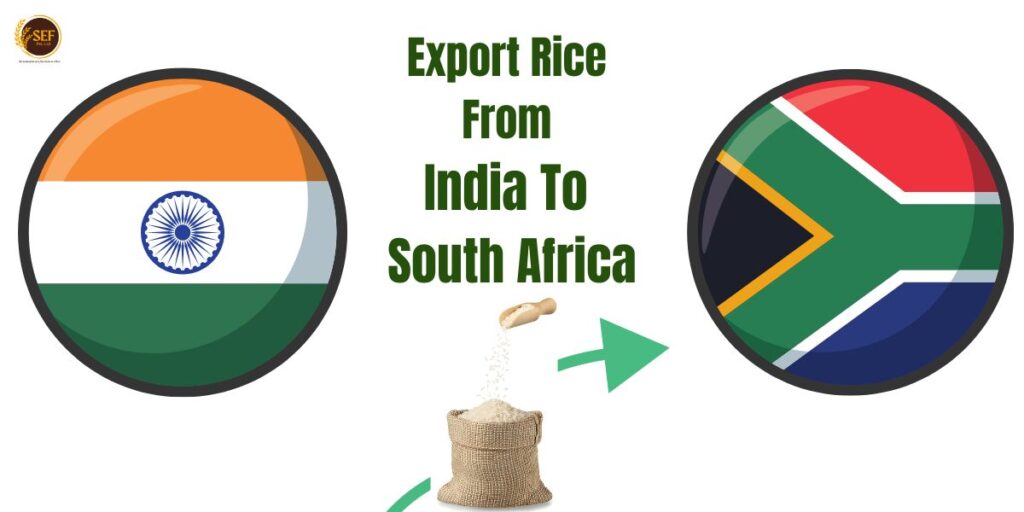


India has firmly established itself as one of the leading rice exporters in the world, delivering both Basmati and Non-Basmati rice to over 100 countries. There is one emerging destination gaining attention from Indian rice exporters, South Africa. However, with increasing demand for high-quality grains and a growing South Asian diaspora, exporting rice from India to South Africa presents an excellent business opportunity.
Whether you are a new exporter or an experienced trader exploring new markets, this guide covers the entire export process from legal compliance to logistics and marketing strategies.
Rice consumption in South Africa is among the highest in Sub-Saharan Africa. Further, here are some reasons exporting rice to South Africa is a profitable business opportunity:
Before starting rice exports from India, ensure compliance with these essential certifications:
However, Whether you are a new exporter or an experienced trader exploring new markets, this guide covers the entire export process from legal compliance to logistics and marketing strategies.
Selecting the right type of rice is critical based on the target market:
| Rice Type | Demand in South Africa | Target Buyers |
|---|---|---|
| Basmati Rice | High (Premium segment) | Indian restaurants, gourmet stores |
| Non-Basmati Rice | High (Mass-market consumption) | Supermarkets, wholesalers |
| Parboiled Rice | Moderate (Household use) | Retail shops, food service providers |
| Organic/Brown Rice | Growing (Health-conscious) | Organic food stores, health outlets |
*Data reflects current market trends in South Africa.
Your success depends on quality and consistency. Furthermore, work with certified Indian rice exporters, such as Shah Enterprises, who offer some of the best rice in India that meets international quality benchmarks.
To tap into South Africa’s rice market, explore these buyer acquisition strategies:
South Africa’s food labeling regulations are enforced by the Department of Agriculture, Forestry, and Fisheries (DAFF). In addition, to comply with packaging regulations, follow these best practices:
Efficient shipping is key to profitable rice exports. South Africa’s key ports include Durban, Cape Town, and Port Elizabeth.
| Mode | Best For | Transit Time | Cost |
|---|---|---|---|
| Sea Freight | Bulk Orders (Cost-effective) | 15–22 Days | ₹4–7/kg |
| Air Freight | Urgent, Small Orders | 3–5 Days | ₹200–₹300/kg |
*Costs may vary based on fuel prices and seasonal demand.
For most rice exporters, sea freight to Durban Port offers the best balance of cost and efficiency.
To export rice from India to South Africa, prepare the following documents:
Export cost per kg depends on rice variety, packaging, and transportation mode:
| S.No | Rice Variety | Grain Length | Type | Price (INR/Kg) | Price (ZAR/Kg) |
|---|---|---|---|---|---|
| 1 | 100% Broken Parboiled Rice | 4.80 mm | Non-Basmati | ₹38.50 | R8.75 |
| 2 | 100% Broken Raw Rice | 4.75 mm | Non-Basmati | ₹37.00 | R8.41 |
| 3 | 1121 Creamy Sella Basmati Rice | 8.25 mm | Basmati | ₹74.50 | R16.93 |
| 4 | 1121 Golden Sella Basmati Rice | 8.30 mm | Basmati | ₹79.50 | R18.07 |
| 5 | 1121 Steam Basmati Rice | 8.35 mm | Basmati | ₹82.00 | R18.64 |
| 6 | 1401 Raw Basmati Rice | 7.60 mm | Basmati | ₹99.50 | R22.61 |
| 7 | 1401 Steam Basmati Rice | 7.65 mm | Basmati | ₹97.00 | R22.05 |
| 8 | 1509 Creamy Sella Basmati Rice | 8.10 mm | Basmati | ₹64.00 | R14.55 |
| 9 | 1509 Golden Sella Basmati Rice | 8.15 mm | Basmati | ₹67.50 | R15.34 |
| 10 | 1509 Steam Basmati Rice | 8.20 mm | Basmati | ₹69.00 | R15.68 |
| 11 | IR 64 Parboiled Rice | 6.30 mm | Non-Basmati | ₹47.00 | R10.68 |
| 12 | IR 64 Raw Rice | 6.20 mm | Non-Basmati | ₹45.00 | R10.23 |
| 13 | PR 11/14 Creamy Sella Basmati Rice | 6.70 mm | Non-Basmati | ₹48.00 | R10.91 |
| 14 | PR 11/14 Golden Sella Basmati Rice | 6.75 mm | Non-Basmati | ₹49.50 | R11.25 |
| 15 | PR 11/14 Steam Rice | 6.80 mm | Non-Basmati | ₹48.50 | R11.02 |
| 16 | Pusa Creamy Sella Basmati Rice | 7.90 mm | Basmati | ₹90.00 | R20.45 |
| 17 | Sarbati Creamy Sella Basmati Rice | 7.50 mm | Basmati | ₹82.00 | R18.64 |
| 18 | Sarbati Golden Sella Basmati Rice | 7.55 mm | Basmati | ₹84.00 | R19.09 |
| 19 | Sarbati Steam Basmati Rice | 7.60 mm | Basmati | ₹86.00 | R19.55 |
| 20 | Sona Masoori Parboiled Rice | 5.50 mm | Non-Basmati | ₹54.50 | R12.39 |
| 21 | Sona Masoori Raw Rice | 5.40 mm | Non-Basmati | ₹52.00 | R11.82 |
| 22 | Sona Masoori Steam Rice | 5.45 mm | Non-Basmati | ₹53.50 | R12.16 |
| 23 | Sugandha Creamy Sella Basmati Rice | 7.80 mm | Basmati | ₹88.00 | R20.00 |
| 24 | Sugandha Golden Sella Basmati Rice | 7.85 mm | Basmati | ₹89.50 | R20.34 |
| 25 | Sugandha Steam Basmati Rice | 7.90 mm | Basmati | ₹91.50 | R20.80 |
| 26 | Swarna Parboiled Rice | 5.30 mm | Non-Basmati | ₹46.00 | R10.45 |
| 27 | Swarna Raw Rice | 5.20 mm | Non-Basmati | ₹44.50 | R10.11 |
| 28 | Traditional Creamy Sella Basmati Rice | 7.70 mm | Basmati | ₹95.00 | R21.59 |
| 29 | Traditional Raw Basmati Rice | 7.50 mm | Basmati | ₹105.00 | R23.86 |
Note: Prices are indicative and may vary based on market conditions and order quantity.
For bulk orders and current pricing, contact our sales team:
To get the best deal, negotiate with freight forwarders and optimize load volumes.
To grow your brand visibility and increase sales, implement the following:
The export of rice from India to South Africa offers tremendous business opportunities for traders who follow compliance, ensure quality, and utilize local networks. With India being one of the top 10 rice exporting countries, Indian exporters have a competitive edge in global trade. South Africa’s demand for quality rice, combined with transparent trade practices and favorable import policies, makes it a promising market for those looking to export rice from India.
Moreover, understanding Indian Rice Prices and offering competitive rates can help exporters win long-term buyers and establish a strong footprint in the region. At Shah Enterprises, we specialize in providing premium Indian rice varieties, ideal for international markets like South Africa. From Basmati to Parboiled Rice, we ensure top-grade quality, timely delivery, and packaging that meets global standards.
Ready to start your export journey? Contact Shah Enterprises today and take your rice business global.
To export rice from India, you need an Import Export Code (IEC) from DGFT, along with FSSAI registration, APEDA registration, and GST certification. Basmati rice exporters may also require lab test reports for quality assurance.
Nigeria is the largest rice-consuming country in Africa due to its massive population and growing urbanization. It is a major market for rice exports from India, especially parboiled rice and non-basmati varieties.
To import from India to South Africa, register with SARS Customs, obtain an import permit if required, and ensure compliance with phytosanitary and labeling standards. Partner with reliable Indian rice exporters to ensure smooth trade.
Top African importers of Indian rice include Benin, Nigeria, South Africa, Senegal, and Ivory Coast. These countries regularly purchase basmati and non-basmati rice due to favorable Indian Rice Prices and consistent quality.
As of now, 20% export duty applies to non-basmati white rice, while basmati rice has zero export duty. Policies may vary, so check current DGFT notifications or customs updates before shipping.
India exports a range of goods to South Africa including rice, pharmaceuticals, textiles, engineering goods, automobile parts, and spices. Among them, Indian rice exports are a key component of bilateral trade.